| Introduction |
I’m delighted to report that Dr Fred Kanampiu will join N2Africa as Project Coordinator based in Nairobi from 1st June. Fred will be known to many of you already for the pioneering research he and his team have conducted on Striga control over the past years – including of course a strong legume component! Fred has been leading and managing a range of international projects – including the SIMLESA project that has a large legume component – and we look forward to benefiting from his rich experience. We have also hired for the Monitoring and Evaluation position and will introduce her to you in the next Podcaster. This means that all key staff are hired for the international positions.
More ...
|
1 |
| Fred Kanampiu to join N2Africa as Project Coordinator |
|
Fred Kanampiu holds a PhD Soil Science-Soil Fertility (Oklahoma State University, Stillwater, USA). He has 25 years of extensive experience in conducting agricultural research, technology development, and dissemination in cereal-legumes-livestock systems in East and Southern Africa, local and regional project implementation, coordination and management, including publishing, with public and international organizations. He has been involved in leading and monitoring the implementation of projects executed across countries, maintaining liaison with key partners and stakeholders in the public and private sectors, ...
|
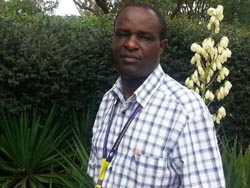 |
|
2 |
| N2Africa planning meeting for Tier 1 countries in Nairobi |
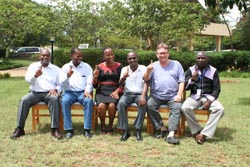 |
On April 14 and 15, a meeting was held at the ICIPE campus in Nairobi to plan for N2Africa phase II activities in the so called tier 1 countries, Kenya, Zimbabwe, Malawi, Mozambique, Rwanda and the Democratic republic of Congo. The meeting was attended by the six country coordinators, senior business development officer Edward Baars, coordinator research and data Joost van Heerwaarden and the N2Africa leadership team represented by Ken Giller, Bernard Vanlauwe and Bashir Jama (AGRA). They were Joined by representatives of AGRA (Kiwia Abednego) and Export Trading Group (Wainaina Kung’u). ...
|
|
3 |
| Introducing the Country Coordinators of the Tier 1 countries |
As indicated above, the Tier 1 countries are the six countries other than Ghana and Nigeria, that participated in the N2Africa project from the start. The country coordinators for these countries are, presented in the order as on the photo in the above article: Lloyd Phiphira (Malawi), Regis Chikowo (Zimbabwe), Speciose Kantengwa (Rwanda), Wilson Leonardo (Mozambique), Paul Woomer (Kenya), Jean Marie Sanginga (DR Congo).
|
4 |
| N2Africa/phase II DR Congo activities have already begun |
|
Opportunities for sustainable intensification of climbing bean on smallholder farming systems in the eastern highlands of DR Congo
South Kivu is located in the eastern part of DRC. This is a productive area, but agricultural productivity has been held back by years of war, overpopulation and land degradation. ...
Photo: Dr Bernard Vanlauwe talking to farmers of Ruzizi
|
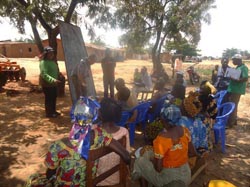 |
|
5 |
| N2Africa Malawi |
Positive developments! despite the absence of N2Africa in the first three months of the 2013/2014 season: (a) huge interest by farmers to use soybean inoculants despite facing hurdles to access the product; (b) the pass-on program of legumes seed from farmer to farmer continued with facilitation by DAES, WVI, CRS, NASFAM and Clinton-Hunter Development Initiatives, among others. ...
|
6 |
| N2Africa in Zimbabwe |
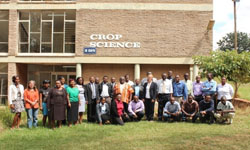 |
From January 2014, the University of Zimbabwe, Crop Science Department, assumed coordination of the project, taking over from CIAT. There has been a seamless changeover, with support from both Judith de Wolf, the previous N2Africa coordinator for Zimbabwe, and Dr Nelson Mango, the CIAT Country Representative in Zimbabwe. ...
|
|
7 |
| N2Africa in Mozambique |
N2Africa is being implemented in close collaboration with many partners. The key partners include Technoserve, CLUSA, IIAM, IFDC, IKURU and many Farmers Associations. The project is conducting dissemination campaigns, demonstration plots, training and awareness creation through these partners, with support from the project. ...
|
8 |
| Kenya update |
|
At the start of Phase II, a model for indirect dissemination is being formulated. Established Action Site partners are maintained and six new development partners willing to disseminate recommended N2Africa technologies have been identified. ...
|
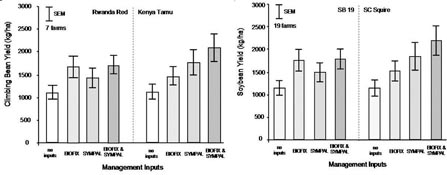 |
|
9 |
| Rwanda update |
In Rwanda the national project staff has been reduced to the country coordinator only. However, there are several partners involved in dissemination activities, inlucing DRD in the districts of Burera, and Gakenke, CARITAS Rwanda in Bugesera district, COCOF in Kamonyi district, and EPR in Kayonza. There are also informal partners such as Clinton Hunter Foundation and One Acre Fund (Tubura) who also have been actively disseminating N2Africa technologies outside the mandate zones of the project. ...
|
10 |
| Exploring the genetic diversity of groundnut-nodulating rhizobia in moist and dry savannas of Nigeria for increased symbiotic nitrogen fixation and productivity |
|
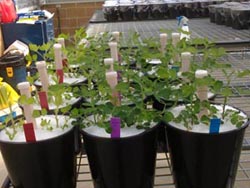
|
My PhD study aims at exploring the genetic diversity of groundnut-nodulating rhizobia and identifying promising strains for inoculant production to benefit the farmers and all stakeholders in groundnut production and utilization. I enrolled for the programme in the Centre for Rhizobium Studies (CRS), Murdoch University, Perth, Western Australia in February, 2013. ... |
|
11 |
| Symbiotic effectiveness of indigenous Bradyrhizobium strains and strategies to maximize the contribution of Biological Nitrogen Fixation on soyabean in Mozambique |
|
Update on PhD research.
The major accomplishment by April 2014 include meeting the University credit requirements and harvesting the screening trial from which promising isolates will be selected and tested in the field both in Brazil and Mozambique in 2014/15 and 2015/16 cropping seasons. Soyabean nodules from 15 locations in Mozambique were brought to Brazil in April 2013. ...
Photo: Amaral Chibeba determining total N content
|
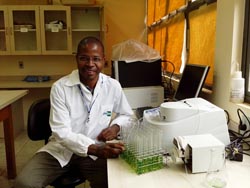 |
|
12 |
| Does the interaction of the indigenous and exotic rhizobia in contrasting Zimbabwean soil conditions result in superior individuals worthy of selection as inoculant strains |
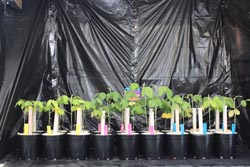 |
Soyabean has been grown since the early 20th century in Zimbabwe with inoculation beginning during the 1960’s. Developments in crop and inoculation technology have progressively increased coverage to present day where inoculant and improved seed are available in every rural province in the country. While the seed industry has benefited from rigorous breeding programmes, inoculation has continued with a narrow range of exotic strains that display superior nitrogen fixation but may be challenged by the local agro-ecologies across the country. ...
|
|
13 |
| Investigating Suboptimal Nitrogen Fixation in Phaseolus vulgaris |
|
Phaseolus vulgaris (common bean) is an important food crop in many parts of Africa. Its yield is often hampered by nitrogen deficiency in soils despite its ability to nodulate and fix nitrogen with a wide range of rhizobia. Bean inoculation programs in Africa have repeatedly been plagued by a lack of, or erratic, inoculation responses in the field ...
|
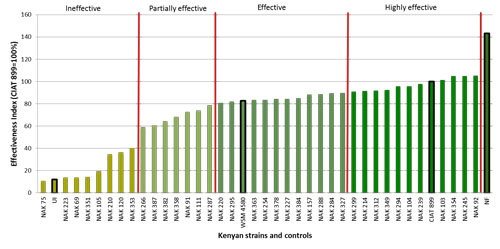 |
|
14 |
| Options to enhance biological nitrogen fixation by soyabean and common bean in smallholder farming systems of Rwanda |
|
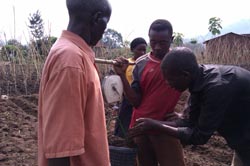
|
Legumes are inoculated with expectation that it will increase nitrogen fixation and grain yield. However, this is not always the case. Among the possible factors affecting the response of legumes to inoculation are competition between indigenous soil strains with introduced ones, sufficient population of soil rhizobia and environmental stresses. ...
Photo: Farmers weighing farm yard manure
|
|
15 |
| The Scaling Seeds and Technologies Partnership: Opportunities for collaboration with N2Africa |
|
On July 1, 2013 USAID and the Alliance for a Green Revolution in Africa (AGRA) announced the Scaling Seeds and Technologies Partnership (SSTP) in Africa, a $47 million, four-year partnership intended to accelerate smallholder farmer access to transformative agricultural technologies.
SSTP is accelerating the adoption of high-yield crop varieties and complementary technologies by smallholder farmers in Africa in support of the New Alliance for Food Security and Nutrition, a shared commitment of African leaders, private sector partners, and donor governments to lift millions out of poverty over the next decade.
...
|
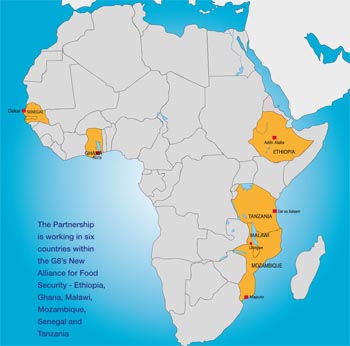 |
|
16 |
| N2Africa-Ethiopia Annual Planning Workshop, 15- 16 April |
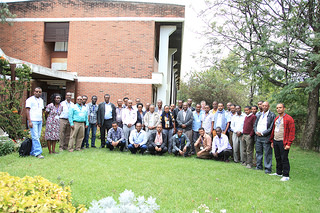 |
N2Africa-Ethiopia annual planning workshop was successfully held on 15-16 April, 2014 at ILRI Addis campus. The conference was made in ILRI’s conference hall with well-furnished display technology which exited the participants. A total of 41 participants from national and regional research institutes, Universities, Ministry of Agriculture, ILRI, CAFS, National Soil, Private sectors, and invited guest from ICRISAT and NGOs have attended the conference. Dr. Amare Tegbaru, N2Africa’s Gender Specialist, Dar es Salam IITA, also attended the planning meeting and made presentations. ...
|
|
17 |
| A quantitative food consumption survey of infants and young children in rural Ghana: a first step in linking agriculture and nutrition |
|
Agricultural models used to analyse and re-design farming systems using multi-objective optimisation do not take into account household nutrition needs, while the development of dietary guidelines do not take into account the local food systems and agricultural productivity. Combination of agricultural productivity and nutritional needs may result in farm designs that optimize nutrition. One of the first steps in linking agriculture productivity and nutritional needs is to identify strategies to improve the nutritional quality of the diet based on locally available foods. ...
|
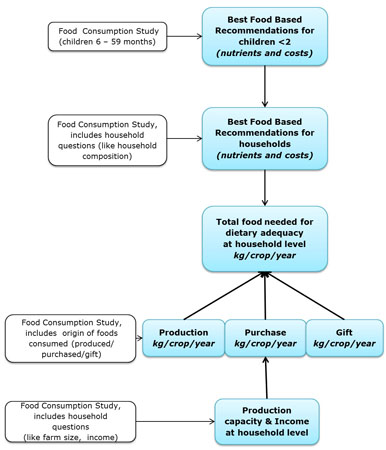 |
|
18 |
| Launch meetings in the Core Countries |
In the previous Podcaster we already informed you about the Phase II launch meetings for the Core Countries Tanzania, Ethiopia, Ghana, Nigeria. The workshop report of the launch meeting held in Tanzania is now available via the N2Africa website. Also a report from the Uganda launch meeting can be accessed there.
|
19 |
| Briefs on Innovation Platforms |
Several briefs on innovation platforms have been developed by ILRI as part of their contribution to the Humid Tropics CRP. The briefs can be downloaded from the ILRI website.
|
20 |














